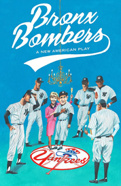Bronx Bombers Star Bill Dawes On the Pressure to 'Not Suck' as Baseball Great Mickey Mantle
About the author:
Bringing an iconic sports hero like Mickey Mantle to life could be an intimidating job for an actor, but Bill Dawes is prepared to step up to the plate. In fact, Dawes already knows a thing or two about embodying professional athletes onstage. In 2010, he portrayed football player Paul Hornung in Eric Simonson's Lombardi, about the legendary Green Bay Packers coach. Previously, Dawes made his Broadway debut opposite Sigourney Weaver in Sex and Longing and has shown his versatility on screen in I Hope They Serve Beer in Hell and on Criminal Minds, Sex and the City and Oz. He returns to Broadway with Simonson’s Bronx Bombers, about the legacy of the New York Yankees. For Broadway.com, Dawes writes about the challenges of bringing the baseball legend to life, how he prepares to play real people (lots of mimosas!) and which Mantle motto he lives by.
![]()
The question I get asked most about playing Mickey Mantle in Bronx Bombers is usually some variation of the following: "Since thousands of hardcore and lifelong Mantle fans are going to see the show, don't you feel a ton of pressure not to suck?" Although I guess it makes sense, I don't think that really has much to do with me or being an actor. Any role you play, you just want to find the integrity of the role and bring as much truth to it as possible, regardless of the person being a celebrated historical figure or not.
When I played Paul Hornung in Lombardi, I was lucky enough to meet him. I actually drove down to Louisville, Kentucky, and we met up for brunch. We drank too many mimosas and he regaled me with story upon story of himself and Vince Lombardi. He took me on the tour of the town and his office, where he presented me with several signed books and photographs. All of this made it was easy to keep alive the memory of the mischievous and fun-loving Paul I had met only weeks earlier. Paul, 73 at the time, seemed happy with his life and his notoriety. His regrets, if he had any, seemed like they had been dealt with.
Mickey Mantle is different, and undoubtedly, a much more complex role. Bronx Bombers is a play about memory and legacy, and Mickey lived his post-Yankees years with an abundance of regrets, which were only exacerbated by his alcoholism. Furthermore, the stories about Mickey I heard, for the most part, didn't come from Mickey. Most are second-hand and anecdotal, and often time, apocryphal. When Mickey spoke on camera about the more troublesome parts of his life and behavior, he could only offer terse apologies and blinked-back tears, as he did in his oft-viewed interview with Bob Costas. Even the covered and measured voice Mickey used in commercials and interviews during the '50s and '60s (famously mimicked by Billy Crystal) didn't seem to remotely encapsulate the wild and hedonistic side I read about in books like the salacious 7 and The Last Boy.
So finding Mickey, the lost soul and tortured manchild we touch upon in the play, becomes an exercise in imagination, like it would with a portrayal of a fictional character. That being said, hatred is bred from ignorance, and the reverse is true. After reading a half-dozen books on Mickey and really understanding the nature and genesis of his pain and self-loathing, I found myself really empathizing and loving the guy.
In the end, I guess any pressure I feel about playing Mickey really comes from the ghost of Mickey Mantle, which ultimately is a creation of my imagination. I don't feel pressure from baseball fans because I accept that my portrayal of Mick is invariably gong to be different from their memories. Luckily, I've been finding that I have enough of a resemblance to Mantle's looks, physique and behavior to satisfy the hardcore devotees. However, if some people don't think I accurately represent him the way they remember, I find myself adopting an oft-used Mantle quote regarding critics: "Well, I don't really give a sh*t!"
